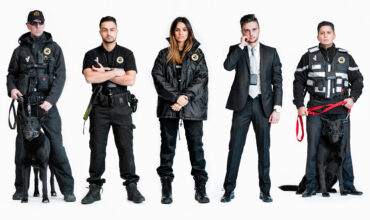-
 Your security in all serenity
Your security in all serenity -
 A tailor made approach
A tailor made approach -
 Passionate people
Passionate people -
 Tools at the cutting edge of technology
Tools at the cutting edge of technology -
 Your events safely
Your events safely

IGS PROTECT is a responsible company for the community and wishes, as such, to scrupulously respect the regulations in force by regularly sensitizing its customers to the rules that govern this sector.

Our company invests in the protection and security of its agents (investment in protective equipment, safety boots, first aid kits, update and training, etc.) and therefore aims to obtain better risk management in order to reduce the number of accidents, to comply with legislation and to improve its performance.

We have a very efficient management system, both in terms of customer management and at operational level. Each section of our business is governed by clear procedures, so that everyone in our business knows what to do and moves forward effectively.
Any legal or natural person authorized by the Ministry of the Interior carrying out or offering activities consisting in providing security services to third parties, on a permanent or occasional basis, or who makes himself known as such (Art2 of the law of 2 October 2017).
Guarding includes all kinds of surveillance and protection of property and people. It is subdivided into thirteen main categories:
This security can be organized in four forms: the security company, the internal security service, volunteers and employees of concessionaires. All this is regulated in the law of October 2, 2017, also called the “law on private and special security” or simply the “law”. There are other forms of guarding outside this framework. These are regulated in other legislations. This is among others the case of municipal guards. We will not dwell here on these forms of guarding.
Source IBZ: https://vigilis.ibz.be/Pages/main.aspx?Culture=fr&pageid=bewaking/burger/watis/introductie
The basic activity consists in surveillance of property or, to be complete, in “surveillance and protection of movable or immovable property”. This means static surveillance, mobile surveillance and intervention after alarm.
The words “surveillance” and “protection” designate certain human interventions that are implemented to protect property. Thus, the provision of a safe against payment does not in itself constitute a security activity. But if, for example, personnel are assigned to monitor this safe, it is in this case a guarding activity.
Regulations: article 1, §1, paragraph 1, 1 ° of the law.
What is the control of people according to the law ..?
The law defines the control of people as a service of “surveillance and control of people in the context of maintaining security in places accessible or not to the public”.
This activity is distinguished from other guarding activities because it does not consist so much in monitoring and protecting property but rather in monitoring the behavior of people. Therefore, this activity covers in particular the organization of doorman services, event security and store inspection. All kinds of access control and security functions in cinematographic complexes or in shopping malls, surveillance in amusement parks, the exercise of so-called security activities during concerts or those of stewards at parties and balls must also be included in this activity.
With the exception of certain very specific exceptions, this activity cannot be exercised on the public highway or in public places. See public road.
Regulations:
– Article 1, first paragraph, §1, 5 ° of the law.
– Circular of 19 November 1999 relating to the entry into force of Article 1, §1, 5 ° of the law of 10 April 1990 regulating private and specific security.
Source IBZ: https://vigilis.ibz.be/Pages/main.aspx?Culture=fr&pageid=bewaking/burger/watis/persoonscontrole
Any company or internal security service wishing to organize security activities must first obtain authorization from the Minister of the Interior. The same goes for a company which, if it does not carry out security activities, makes itself known as such.
The authorization is granted for a period of five years and can be renewed thereafter for periods of the same duration. The applicant must meet a number of authorization conditions. Authorization is granted for one or more kinds of guarding activities and according to a specific authorization procedure.
When granting authorization, the Minister of the Interior may exclude certain activities or the use of certain means and methods. It may also make the authorization subject to specific conditions. Authorization may be granted under suspensive or resolving conditions. In the first case, the authorization is only issued after a certain condition has been met; in the second case, it is automatically resolved if a certain condition is not met.
can end in four ways:
– because the company or the internal security service to which or to which an authorization has been granted under resolving condition does not respect the imposed condition;
– because the authorization expires and the company does not request a renewal at the end of the period of validity of the authorization;
– because the holder of the authorization himself requests the voluntary withdrawal of his authorization from the Minister of the Interior;
– because the Minister of the Interior withdraws the authorization as a sanction.
The authorization relates to the right to engage in guarding activities or to make oneself known as such. The authorization therefore does not expire because a company ceases to carry on its activities.
In some cases, a company may temporarily use the authorization of another company. It is a business that merges with an authorized business, takes over an authorized business, or an authorized business with changed legal personality. In these cases, the new legal entity may continue the guarding activities of the company initially benefiting from the authorization during the period preceding the notification of the decision relating to the authorization request.
All deeds, invoices, announcements, publications, letters, order notes, website and other documents, whether electronic or not, which are paid by a company or an internal service must mention the authorization for donations company or internal service.
Source IBZ: https://vigilis.ibz.be/pages/abcdef.aspx?PageId=bewaking/burger/trefwoorden&Culture=fr&keyword=autorisation&searchkeyword=